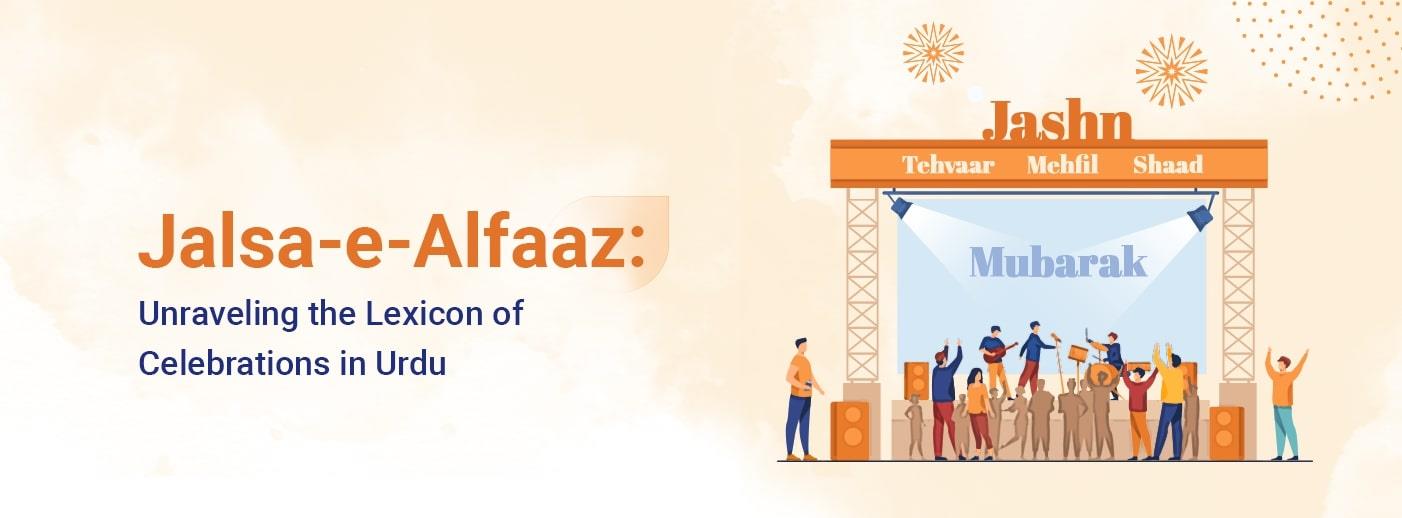अधिक खोजे गए शब्द
सहेजे गए शब्द
खिस्यानी बिल्ली खम्बा नोचे
जिसे क्रोध आ रहा हो वह अपनी खीझ या क्रोध दूसरों पर उतारता है, लाचारी में आदमी दूसरों पर क्रोध करता है, लज्जित व्यक्ति दूसरों पर अपनी लज्जा उतारता है, निर्बल की खीझ
कोशिश
कोई काम करने के लिए विशेष रूप से किया जानेवाला प्रयत्न, मेहनत, दौड़ धूप, प्रयत्न, प्रयास, चेष्टा, उद्योग, श्रम, उद्यम, उपाय, परिश्रम
आठ बार नौ त्योहार
सुख-सुविधा और आराम का शौक़ या लगन ऐसा बढ़ा हुआ है कि युग और समय उसको अल्प व्यय नहीं करने देता
चमनिस्तान
ऐसा बाग़ जहाँ फूल ही फूल हों, ऐसी जगह जहाँ दूर तक फूल ही फूल और हरा भरा नज़र आए, वाटिका, चमन, बाग़
दादरा
संगीत में एक प्रकार का चलता गाना (पक्के या शास्त्रीय गानों से भिन्न), एक प्रकार का गान, एक ताल
Jalsa-e-Alfaaz: Unraveling the Lexicon of Celebrations in Urdu

As the festive season unfolds, and party hats become the must-have accessory, the air is filled with a light spirit that sets the perfect backdrop for celebrations.
But dear readers, amidst all the chaos and frenzy of these celebrations, have you ever wondered how these celebrations and their aura is described in Urdu? If not, then prepare to be pleasantly surprised by the enchanting vocabulary that Urdu brings to the table, sprinkling the perfect dash of spice over our festivities, events, and moments of merriment.
Urdu, with its poetic flair and rhythmic pulse, offers a lexicon that turns even the mundane into a celebration. From the mellow tones of "mubarak" to the elated echoes of "shor," this linguistic carnival turns each gathering into a harmonious symphony of words. It's not just about participating in these celebrations; it's about experiencing them in a downright melodious fashion.
So, before you're fashionably late to the party, let’s dive right into this vocabulary fiesta!
The term ‘jashn’ means a feast or celebration of any kind. Unlike the common perception, the term ‘jashn’ can be employed for any sort of celebrations, be lit social, religious, cultural or even literary ones!
Just like how we call it ‘Jashn-e-Rekhta’ (which is right around the corner), that pays homage to the Urdu language, literature, and culture. You can check out more details about the Jashn here.
Another term commonly used in the context of celebrations is ‘jalsa’. The term jalsa primarily means a sitting, meeting or an assembly. However, jalsa is more commonly used to refer to a a gathering for entertainment (song, dance or concert). You can think of it as the Urdu word for gala, but obviously in a more enigmatic way.
A term better suited to refer to a sitting, meeting or an assembly is ‘mehfil’. A mehfil can be a gathering of any sorts, including professional meetings to cultural events. Originally referring to gatherings in the opulent Mughal courts, where esteemed courtesans showcased their talents to the royals, mehfil is now used to refer to gatherings, which can be of any nature.
Adding a touch of religious fervor, 'tehvaar' in Urdu translates to festivals, especially those of a religious nature. Urdu speakers refer to festivals like ‘Diwali ke tehvaar ki chutti hai’ or ‘Eid ka tehvaar saal mein do baar aata hai’. Interestingly, in the UP-Bihar-Jharkhand dialect, 'tehvaari' takes on a unique meaning, referring to the bonus money received on the occasion of festivals.
Now, let's dive into the symphony of celebrations with the term 'dhoom.' It's the life of the party, quite literally – representing all the noise and commotion that makes these events memorable. And if we're turning up the volume, let's not forget 'dhoom-dhaam,' the adjective that screams uproar. You might have heard whispers like, "unhone apne bete ki shaadi bohot dhoom-dhaam se karwayi hai," translating to 'they've thrown a wedding bash for their son with all the pomp and show’.
The term ‘shaad' of this glorious vocabulary is hidden just beyond the surface level, like an introverted cousin who’s packed with lots of fun stories and jokes. Shaad literally means pleased or delighted, and is not very commonly used, but has a sophisticated and elegant touch to it. Compound words made with shaad like ‘shaad-aabaad’ (meaning happily inhabited, free from care or anxiety) and dil-shaad (cheerful, glad) are used in joyous occasions, mostly by the Urdu elites of the group.
Other Urdu words used for celebrations and functions and events are bazm, juloos, anjuman, majma’, daa’vat etc. Each term brings its unique flavor to the linguistic banquet of festivities, adding a distinct flair to different types of social, religious, and cultural events.
And with this dear readers, we call it a day in the party of these charismatic and joyous words. We hope you picked up something you can show-off in the next party you attend. Until then, take care and have a great festive season. Also, mark your presence at the Jashn-e-Rekhta (you really wouldn’t want to miss this), and we’ll see you soon as we've always got more linguistic surprises up our sleeves!
Delete 44 saved words?
क्या आप वास्तव में इन प्रविष्टियों को हटा रहे हैं? इन्हें पुन: पूर्ववत् करना संभव नहीं होगा





